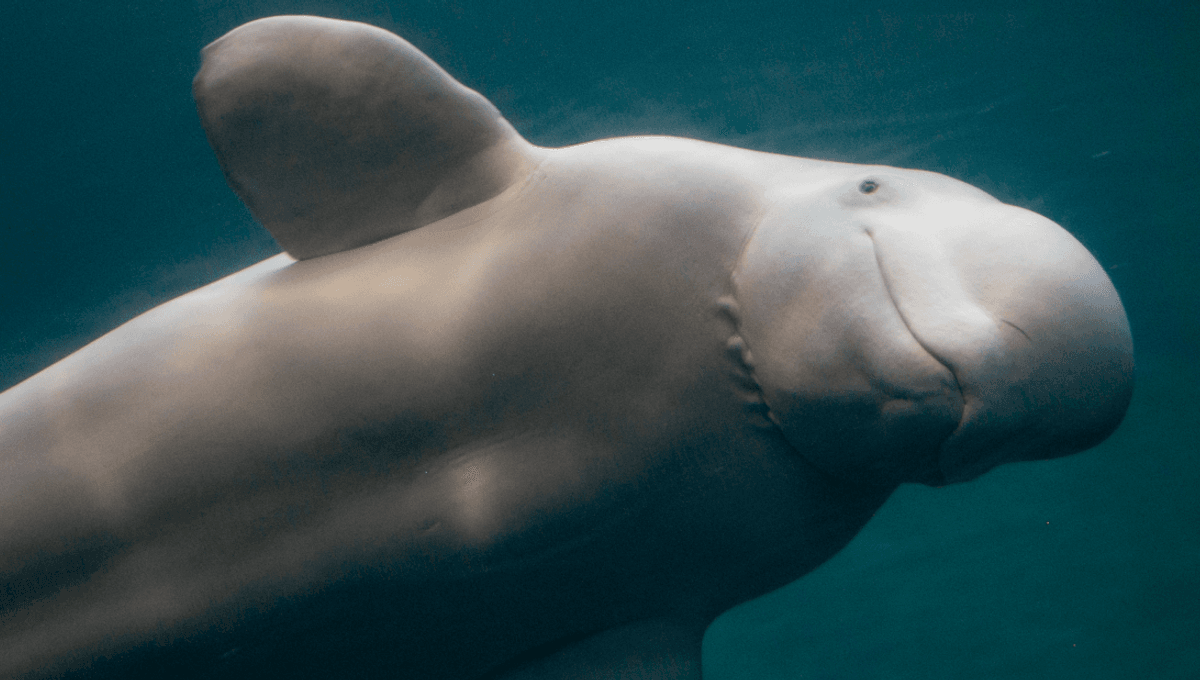
In 1984, a team of scientists were studying a group of dolphins and whales at the National Marine Mammal Foundation (NMMF). During their research, staff had started to notice weird, human-like noises coming from inside the enclosure. They described it as sounding like two people speaking.
Things got even weirder when a diver pulled themselves out of the water asking, “Who asked me to get out?” None of the humans had, but the incident led them to one of their non-human residents: NOC, the beluga whale.
NOC was one of three belugas that had been delivered to the NMMF in 1977 having been caught in Manitoba, Canada. The team started recording him and even trained him to “speak” on command, revealing that his vocalizations were several octaves lower than your typical beluga’s, reaching a pitch similar to human speech.
How did he do it? It seems that by increasing the pressure of air going through his nasal passages, he was able to lower his vocalizations in a way that mimicked the humans he spent so much time around. Belugas have phonic lips that sit above each nasal passage, and this is why he was able to switch the sound up in such a way that it mirrored human speech.
That’s not to say that NOC was babbling away with the proficiency of Earth’s great mimics like parrots, but it was a pretty good impression and relatively unheard of in whales. There had been another beluga at the Vancouver Aquarium in Canada who was said to have vocalized his own name: Lagosi.
Even totally wild belugas are famous for that chatty character. Nicknamed “the canaries of the sea,” they can squeak, click, buzz, and babble as they communicate with one another. Perhaps most impressive is the way they can manipulate their melons – fat-filled sensory organs on their heads – to get their point across.
“Beluga melons are not just lumps of fat, they are made up of several different tissue types, including muscles, connective tissues, and fats with differing densities and acoustic properties,” said beluga researcher Jaclyn Aubin, PhD candidate at the University of Windsor, to IFLScience.
“These fats are important for both vocal communication and for echolocation and are used to focus and project the sounds that belugas produce. Several facial muscles and connective tissues are used to alter the shape of the melon, which allows belugas to modify their vocalisations, perhaps to deliver more focused and directional sounds.”
“While alterations in the shape of the melon play a role in altering the vocalisations of belugas, they may also serve as a visual signal to other belugas. Particularly rambunctious males have been noted to expand their melons dramatically, suggesting that the shape of a beluga’s melon could provide clues to other belugas about their mood and behavioural state.”
“Beluga vocalisations are so complex that we still have not managed to create a full repertoire of all their call types, let alone understand the function of most calls. One call that we understand particularly well is the contact call, a call that belugas use to maintain group cohesion, and that mothers and calves use to stay close to each other.”
Must make for confusing research conditions when you’re never quite sure who’s going to start “talking” next. Spare a thought for one person, who encountered the world’s first swearing duck.
Source Link: In 1984, Scientists Noticed Strange “Voices” Coming From Their Cetacean Enclosure